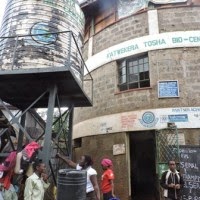COVID-19 Exacerbates Kenyan Inequality of Water Accessibility
As the pandemic rages on around the world, many countries have had to deal with doing daily tasks under a “new normal”, including safety precautions such as wearing face coverings, social distancing and frequent hand washing. However, in many areas of Kenya, where access to water is not as easy as turning on a faucet, some of these safety precautions are not possible.
In April, Nairobi experienced a landslide in Aberdare Forest that broke essential water pipes. This lead to the shutting down of water production at Sasumwa Dam Treatment in early May. This dam supplies 11.6 percent of water to the Nairobi City County Population, according to Acting Manager Director Nahashon Muguna of Nairobi City Water and Sewerage Company. When asked about repairs, he cited heavy rains making access and repair difficult, promising “the government is doing everything possible to restore the supply to residents of Nairobi.”
Kenyans in affected areas were asked to use available water sparingly and water distribution points were set up. Many took advantage of the situation, setting up private boreholes and trucks, all while jacking up prices. Maureen Mkala of Mathare, a slum in Nairobi, waited up to an hour in extremely crowded water points to get 20 liters of water for her family, which includes three children. She has had to ignore social distancing to wait in line, only to get a minimal amount of water to drink and to wash her and her family’s hands to prevent the virus.
Maureen’s ability to get water has always been a struggle, as Mathare does not have any taps or pipes that flow into their informal settlements. However, the danger of living in such areas is heightened, as clean water is needed more urgently, and social distancing is hard with the dense population of 500,000 people. Hand washing, social distancing and wearing a face covering is essential in slowing the spread of COVID-19, but in such areas as Mathare, this is hard to execute.
The Aberdare Forest landslides also forced the shutdown of the Ng’ethu plant, which supplies up to 85% of the capacity cubic meters. Later, in early July, the Nairobi City Water and Sewerage Company shut the Ngethu Water Treatment plant again, but for 48 hours to facilitate repairs due to heavy rainfall.
In early June, water flowed back into Nairobi homes after repairs on the water pipes of the Sasumwa Dam Treatment. Even as many breathed a sigh of relief, there are still drastic inequalities in Nairobi water access. Water Cabinet Secretary Simon Chelugui stated that Nairobi’s current water demand is above 800,000 cubic meters per day, compared to the installed capacity of 526,000 cubic meters per day. Rationing water has become the norm, regardless of tap access or not.
Even with the reopening of water plants, many still have to walk to water distribution points, boreholes and other areas to buy water. Social distancing is essential but not always done, as many wait long hours to get to freshwater to drink and clean themselves. To those that have tap access, water rationing cycles are maintained, leading to low-pressure water during supply days.
In a pandemic, water is essential to livelihood. Having access to clean water to wash one’s hands is absolutely necessary to keep oneself healthy. COVID-19 has only further exposed the inequalities of water access in Nairobi. Many countries have offered aid to Kenya in this time,
especially in terms of water and soap access.
The EU, along with Sweden, Finland and Denmark, have mobilized a total of Ksh 211 million to target 119,000 people in COVID-19 hotspots in 25 countries, including Kenya. The U.S. Agency for International Development announced Ksh ~5.4 billion to support Kenya during COVID-19. The Kenyan government has continued to monitor dams and plants, along with supporting staff training for COVID-19 awareness.
Water access has always been a problem throughout all of Kenya, but as Water CS Chelugui said himself, “water is a national resource”. Water should be treated as such. It should distributed fairly to the people, whether they live in houses or informal settlements, and treated not just as a national resource, but as a fundamental human right. Kenya, as well as all other nations, should do by these words, and make sure the national resource of water be equally allocated to all.
Written by Crissy Sak
Cited Sources:
Ministry of Water & Sanitation & Irrigation. (n.d.). Ministry of Water & Sanitation And Irrigation. https://www.water.go.ke/
United States Providing KSH 5 Billion to Support Health and Economy Recovery in Kenya’s COVID-19 Response. (2020, July 1). U.S. Embassy in Kenya. http://ke.usembassy.gov/united-states-providing-ksh-5-billion-to-support-health-and-economy-recovery-in-kenyas-covid-19-response/
Kihiu, N. (2020, July 8). City water firm announces 48-hour supply disruption for scheduled maintenance – Capital News. Capital News. https://www.capitalfm.co.ke/news/2020/07/city-water-firm-announces-48-hour-supply-disruption-for-scheduled-maintenance/
Koech, G. (2020a, January 10). Why Nairobi taps could soon run dry despite assurances. The Star. https://www.the-star.co.ke/news/2020-01-10-why-nairobi-taps-could-soon-run-dry-despite-assurances/
Koech, G. (2020b, May 1). Dry taps in city as Ng’ethu treatment plant shut to avoid contamination. The Star. https://www.the-star.co.ke/news/2020-05-01-dry-taps-in-city-as-ngethu-treatment-plant-shut-to-avoid-contamination/
Koech, G. (2020c, June 1). Sigh of relief as Nairobians assured of water after Sasumua pipeline
repaired. The Star. https://www.the-star.co.ke/counties/nairobi/2020-06-01-sigh-of-relief-as-nairobians-assured-of-water-after-sasumua-pipeline-repaired/
Riordan, L. (2020, May 11). Access to water and sanitation in Kenya fight COVID-19. International Cooperation and Development – European Commission. https://ec.europa.eu/international-partnerships/stories/access-water-and-sanitation-kenya-fight-covid-19_en
Tanui, C. (2020, May 8). Nairobi water firm shuts down Sasumwa Dam supply as landslide damages transmission line – Capital News. Capital News. https://www.capitalfm.co.ke/news/2020/05/nairobi-water-firm-shuts-down-sasumwa-dam-supply-as-landslide-damages-transmission-line/
Yusuf, M. (2020, June 2). Kenyan Capital’s Water Shortage Raises COVID-19 Risk | Voice of America—English. VOA. https://www.voanews.com/covid-19-pandemic/kenyan-capitals-water-shortage-raises-covid-19-risk



Comments
Post a Comment